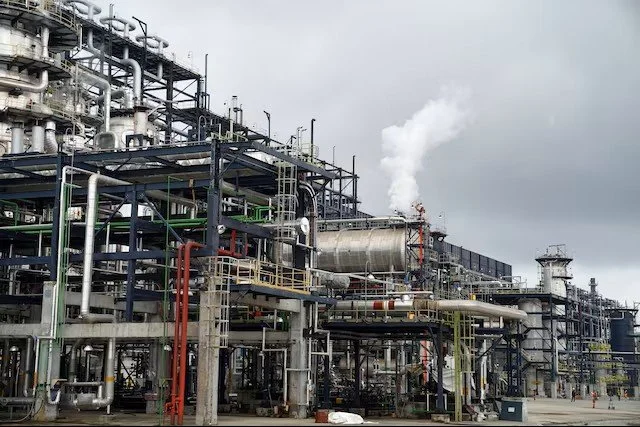U.S. Becomes Net Crude Oil Exporter to Nigeria Amid Biafra's Potential Emergence
In a historic shift, the United States became a net exporter of crude oil to Nigeria in February and March 2025, driven by reduced U.S. East Coast demand due to refinery maintenance and increased Nigerian demand from the Dangote refinery, Africa's largest, located near Lagos. This development, reported by the U.S. Energy Information Administration (EIA) on July 22, 2025, marks the first time the U.S. exported more crude to Nigeria than it imported, reversing Nigeria's traditional role as a top crude supplier to the U.S., where it ranked ninth in 2024.
By the Numbers
U.S. Exports to Nigeria: 111,000 barrels per day (b/d) in February, 169,000 b/d in March 2025.
U.S. Imports from Nigeria: Dropped from 133,000 b/d in January to 54,000 b/d in February and 72,000 b/d in March 2025.
The decline in U.S. imports was largely due to maintenance at the Phillips 66 Bayway refinery in New Jersey, while Nigeria's demand surged as the Dangote refinery, which began processing crude in January 2024, ramped up operations. The refinery, with a capacity of 650,000 b/d, is currently processing around 550,000 b/d but faced challenges securing sufficient domestic crude, leading to imports of U.S. West Texas Intermediate (WTI) and other grades.
Context: The Dangote Refinery and Nigeria’s Oil Dynamics
The $19 billion Dangote refinery, inaugurated in May 2023, aims to end Nigeria’s reliance on imported fuels by producing 50 million liters of gasoline and 15 million liters of diesel daily, exceeding domestic demand and enabling exports. However, Nigeria’s upstream sector struggles with crude theft, pipeline sabotage, and declining production (from 2.4 million b/d in 2005 to 1.3 million b/d in 2024), forcing the refinery to import crude, including 16 million barrels of WTI in 2025. The Nigerian National Petroleum Company (NNPC) supplies only 300,000 b/d, far below the refinery’s needs, prompting calls for stronger enforcement of the Domestic Crude Supply Obligation (DCSO) under the Petroleum Industry Act (PIA).
The Biafra Connection
Much of Nigeria’s crude oil is produced in the Niger Delta, a region historically associated with the Biafra movement, which sought independence in the 1967–1970 civil war. Nigeria’s control over Biafran oil resources fuels conflict and economic mismanagement. The Dangote refinery’s reliance on U.S. crude reflects Nigeria’s failure to secure local supply from the Niger Delta, where Biafran territories are located, due to systemic issues like corruption and insecurity.
Why Biafra’s Emergence Matters
The emergence of an independent Biafra could significantly reshape regional oil trade and Nigeria’s economy for the following reasons:
Control Over Niger Delta Resources: The Niger Delta, rich in light-sweet crude like Bonny Light, produces much of Nigeria’s oil. An independent Biafra could prioritize local refining, ensuring the Dangote refinery receives adequate domestic crude, reducing reliance on imports and stabilizing fuel prices. This aligns with sentiments on X, which criticize Nigeria’s export of crude while importing refined products, exacerbating foreign exchange losses.
Economic Self-Sufficiency: Biafra’s control over its oil could foster a self-sufficient energy sector, mirroring the Dangote refinery’s goal of ending Nigeria’s import dependency. By managing its own crude, Biafra could negotiate better trade terms, potentially supplying the U.S. and reducing reverse flows from America. This could also attract investment from divesting oil majors, boosting production beyond Nigeria’s current 1.3 million b/d.
Addressing Local Grievances: Biafran advocates argue that Nigeria’s mismanagement of oil wealth has marginalized the Niger Delta, fueling environmental degradation and unrest. An independent Biafra could reinvest oil revenues locally, addressing community concerns like emissions and spills raised by activists near the Dangote refinery. This could stabilize the region, ensuring consistent crude supply to refineries.
Global Trade Implications: The U.S.-Nigeria trade reversal highlights a fluid global oil market. A Biafran state could disrupt this dynamic by prioritizing domestic refining and exports of refined products, challenging European markets and reducing Nigeria’s $17 billion annual gasoline trade with Europe. This aligns with expert views that African refineries like Dangote could reshape global crude flows.
Expert Perspectives
Analysts suggest the U.S.-Nigeria trade shift may be temporary, driven by specific market conditions. Eli Tesfaye of RJO Futures called it “a snapshot of a very fluid market,” while UBS’s Giovanni Staunovo noted that Dangote’s shift to domestic crude and other grades could reduce U.S. exports. However, without increased NNPC supply, Dangote’s import reliance persists, underscoring the need for regional control over resources, as a Biafran state could provide.
Conclusion
The U.S. becoming a net crude exporter to Nigeria in early 2025 underscores the inefficiencies in Nigeria’s oil sector, particularly its failure to supply domestic refineries like Dangote.
The emergence of Biafra could address these challenges by securing Niger Delta crude for local refining, reducing import dependency, and fostering economic stability.
Biafra’s potential independence could empower the region to leverage its oil wealth, reshape global trade flows, and fulfill the Dangote refinery’s vision of self-sufficiency, benefiting both local communities and the broader African energy market.


